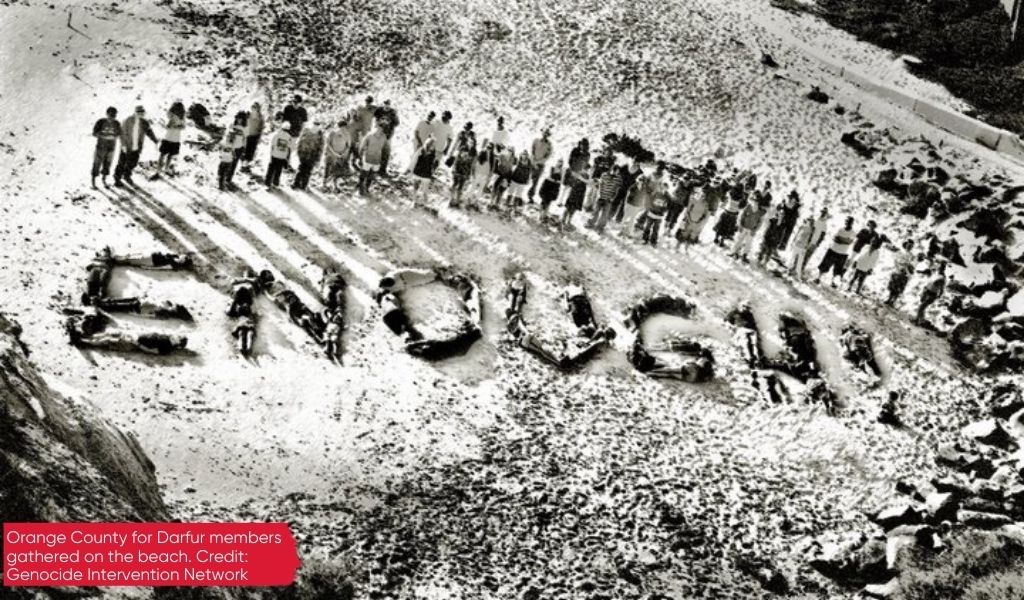On 9 December 2020, a roundtable of experts, discussed religious inequalities and what can be done to prevent genocide, especially given the current Uyghur crisis in China. The event, co-hosted by CREID partners IDS and Refcemi, the Coptic Orthodox Office for Advocacy and Public Policy, was organised to coincide with the International Day of Commemoration and Dignity of the Victims of the Crime of Genocide and of the Prevention of this Crime.

Save Darfur activists from Orange County. Credit: Genocide Intervention Network (CC BY-NC-SA 2.0)
The roundtable, which included parliamentarians, civil servants, researchers and NGO representatives, heard from the following speakers:
- Archbishop Angaelos, Founder and Director of Refcemi
- Lord Alton of Liverpool, Crossbench peer at the UK House of Lords
- Professor Mohammed Ihsan, Visiting Senior Research Fellow at King’s College London and former senior official with the Iraqi Government
- Dr Enver Tohti, former surgeon in China, advocate on human rights violations against religious minorities in China
- Ewelina Ochab, Deputy Director of Refcemi and Co-Founder of the Coalition for Genocide Response.
During the event, Archbishop Angaelos reminded the participants about the recent mass atrocities based on religion or belief that may be classified as genocide under Article II of the UN Convention on the Prevention and Punishment of the Crime of Genocide. These include those perpetrated by Daesh against religious minorities in Iraq and Syria, by the Burmese military against the Rohingya Muslims, and by the Chinese Communist Party (CCP) against the Uyghurs. His Eminence asked “what needs to be done to prevent similar atrocities in the future?”
How thinking about trade could lead to a more comprehensive response to genocide
Lord Alton discussed the situation around the word and presented his proposal for change: the so-called Genocide Amendment to the Trade Bill, an amendment that aims to equip the High Court of England and Wales to make a determination of genocide, a determination that could then be subsequently used to revoke international bilateral trade agreements with the state standing accused of committing genocide. On 7 December 2020, the Genocide Amendment was debated by the House of Lords and received significant support of 287 votes to 161. It will not proceed to the House of Commons. If it becomes law; the Genocide Amendment could pave the way toward more comprehensive response to genocide.
Professor Mohammed Ihsan focused on the situation in Iraq and explained how the recent atrocities perpetrated by Daesh derive from religious inequalities. He further discussed the issue of justice and accountability and how their lack has provided a fertile ground for future mass atrocities. As Professor Ihsan explained, the Daesh atrocities are also a result of impunity for the historic atrocities against religious minorities. He emphasised the need to address the Daesh atrocities to break the vicious circle of atrocities and ensure better future for minorities in the country.
Dr Enver Tohti discussed the situation of Uyghurs in China, their discrimination and marginalisation over several centuries, and ultimately their persecution in the so-called ‘re-education’ camps, forced incarceration camps for Uyghurs where they are stopped of their religious and cultural identity. Dr Tohti also addressed the issue of organ harvesting from religious minorities, Falun Gong practitioners but also the Uyghurs.
Ewelina Ochab provided theoretical framework for assessing the risk of mass atrocity crimes, and specifically genocide, focusing on the UN Framework of Analysis for Atrocity Crimes (PDF) and the Jacob Blaustein Institute for the Advancement of Human Rights Compilation of Risk Factors and Legal Norms for the Prevention of Genocide (the Compilation). Using the Compilation, Ochab analysed by situation of Uyghurs in China and assessed it against the relevant risk factors which suggests that there are concerning risk factors of genocide that need to be addressed as a matter of urgency.
The panellists engaged with the question on how to consider the impact of religious inequalities for genocide prevention. They identified the following three areas where greater effort could contribute towards preventing future genocides:
- monitoring
- assessment and determination
- and informed responses as the three main focus areas.
As such, steps need to be taken to ensure that states have comprehensive domestic mechanisms that monitor situations of concern and assess them against the risk factors of genocide (or risk factors of atrocity crimes), make determinations on the risks and crimes involved, and respond to them accordingly, fully taking into account the risks involved, the nature of the crimes.
